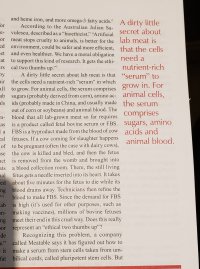Drareg
Member
- Joined
- Feb 18, 2016
- Messages
- 4,772
The inspiration for lab grown meat comes from Pfizers left over vaccine slurry, considering many of the neo-meat companies were floated on the stock market it explains the hype, the pump is soon to become a dump.
Once again big corporate is looking for public tax payer investment to save the planet via lab grown meat, the private market will take too long they said, funny because for years we were told the privatization of everything public owned makes things more efficient, same logic as bailing banks out, socialize the losses when they are too big, the cost of lab grown meats plants are astronomical.
What justifies the wealth transfer from the public purse for lab grown protein globules? well saving the planet of course via the climate change narrative, so much money is being transferred to the ruling class via the climate change narrative.
This is a great article, it appears journalists are still practicing journalism out there, they are like artisans at this point, rare.

 thecounter.org
thecounter.org
It’s a digital-era narrative we’ve come to accept, even expect: Powerful new tools will allow companies to rethink everything, untethering us from systems we’d previously taken for granted. Countless news articles have suggested that a paradigm shift driven by cultured meat is inevitable, even imminent. But Wood wasn’t convinced. For him, the idea of growing animal protein was old news, no matter how science-fictional it sounded. Drug companies have used a similar process for decades, a fact Wood knew because he’d overseen that work himself.
For four years, Wood, who has a PhD in immunology, served as the executive director of global discovery for Pfizer Animal Health. (His division was later spun off into Zoetis, today the largest animal health company in the world.) One of his responsibilities was to oversee production of vaccines, which can involve infecting living cells with weakened virus strains and inducing those cells to multiply inside large bioreactors. In addition to yielding large quantities of vaccine-grade viruses, this approach also creates significant amounts of animal cell slurry, similar to the product next-generation protein startups want to process further into meat. Wood knew the process to be extremely technical, resource-intensive, and expensive. He didn’t understand how costly biomanufacturing techniques could ever be used to produce cheap, abundant human food.
They “should increase public funds for R & D into cultivated meat technology” in order to “seize the opportunity and reap the benefits of becoming global leaders” in the space. In late April, just six weeks later, that message was amplified by The New York Times. In a column called “Let’s Launch a Moonshot for Meatless Meat,” Ezra Klein, a co-founder of Vox who is now one of the Times’s most visible and influential writers, arguedthat the U.S. government should invest billions to improve and scale both plant-based meat alternatives (like the Impossible Burger) and cultivated meat.
In an interview by phone, Wood wondered if GFI was being disingenuous—or if the organization was simply naive.
“After a while, you just think: Am I going crazy? Or do these people have some secret sauce that I’ve never heard of?” Wood said. “And the reality is, no—they’re just doing fermentation. But what they’re saying is, ‘Oh, we’ll do it better than anyone else has ever, ever done.”
In fact, GFI was well aware of Wood’s line of criticism. Several months earlier, Open Philanthropy—a multi-faceted research and investment entity with a nonprofit grant-making arm, which is also one of GFI’s biggest funders—completed a much more robust TEA of its own, one that concluded cell-cultured meat will likely never be a cost-competitive food. David Humbird, the UC Berkeley-trained chemical engineer who spent over two years researching the report, found that the cell-culture process will be plagued by extreme, intractable technical challenges at food scale. In an extensive series of interviews with The Counter, he said it was “hard to find an angle that wasn’t a ludicrous dead end.”
Humbird likened the process of researching the report to encountering an impenetrable “Wall of No”—his term for the barriers in thermodynamics, cell metabolism, bioreactor design, ingredient costs, facility construction, and other factors that will need to be overcome before cultivated protein can be produced cheaply enough to displace traditional meat.
“And it’s a fractal no,” he told me. “You see the big no, but every big no is made up of a hundred little nos.”
Who’s right? Is cultured meat our best hope to save the climate, a billion-dollar boondoggle, or something in between? Will it ever make sense to produce food the way we currently make our drugs?
The stakes couldn’t be higher. In August, the United Nations released a nearly 4,000-page report amounting to what it called a “code red for humanity”: Unless the world’s nations make a vast, coordinated effort to stop burning fossil fuels and razing forests, we’ll find ourselves locked into an even more dire, unforgiving future than the one we’re facing now. At a time when bold environmental solutions are needed, we can only afford to direct public and private investment toward solutions that actually work. But without looking more closely at the fundamentals—something media has largely declined to do—we can’t know whether cultured meat is our salvation or an expensive distraction.
@haidut @Giraffe
Once again big corporate is looking for public tax payer investment to save the planet via lab grown meat, the private market will take too long they said, funny because for years we were told the privatization of everything public owned makes things more efficient, same logic as bailing banks out, socialize the losses when they are too big, the cost of lab grown meats plants are astronomical.
What justifies the wealth transfer from the public purse for lab grown protein globules? well saving the planet of course via the climate change narrative, so much money is being transferred to the ruling class via the climate change narrative.
This is a great article, it appears journalists are still practicing journalism out there, they are like artisans at this point, rare.

Lab-grown meat is supposed to be inevitable. The science tells a different story.
Headlines have overshadowed inconvenient truths about biology and cost. Now, new research suggests the industry may be on a crash course with reality.
It’s a digital-era narrative we’ve come to accept, even expect: Powerful new tools will allow companies to rethink everything, untethering us from systems we’d previously taken for granted. Countless news articles have suggested that a paradigm shift driven by cultured meat is inevitable, even imminent. But Wood wasn’t convinced. For him, the idea of growing animal protein was old news, no matter how science-fictional it sounded. Drug companies have used a similar process for decades, a fact Wood knew because he’d overseen that work himself.
For four years, Wood, who has a PhD in immunology, served as the executive director of global discovery for Pfizer Animal Health. (His division was later spun off into Zoetis, today the largest animal health company in the world.) One of his responsibilities was to oversee production of vaccines, which can involve infecting living cells with weakened virus strains and inducing those cells to multiply inside large bioreactors. In addition to yielding large quantities of vaccine-grade viruses, this approach also creates significant amounts of animal cell slurry, similar to the product next-generation protein startups want to process further into meat. Wood knew the process to be extremely technical, resource-intensive, and expensive. He didn’t understand how costly biomanufacturing techniques could ever be used to produce cheap, abundant human food.
They “should increase public funds for R & D into cultivated meat technology” in order to “seize the opportunity and reap the benefits of becoming global leaders” in the space. In late April, just six weeks later, that message was amplified by The New York Times. In a column called “Let’s Launch a Moonshot for Meatless Meat,” Ezra Klein, a co-founder of Vox who is now one of the Times’s most visible and influential writers, arguedthat the U.S. government should invest billions to improve and scale both plant-based meat alternatives (like the Impossible Burger) and cultivated meat.
In an interview by phone, Wood wondered if GFI was being disingenuous—or if the organization was simply naive.
“After a while, you just think: Am I going crazy? Or do these people have some secret sauce that I’ve never heard of?” Wood said. “And the reality is, no—they’re just doing fermentation. But what they’re saying is, ‘Oh, we’ll do it better than anyone else has ever, ever done.”
In fact, GFI was well aware of Wood’s line of criticism. Several months earlier, Open Philanthropy—a multi-faceted research and investment entity with a nonprofit grant-making arm, which is also one of GFI’s biggest funders—completed a much more robust TEA of its own, one that concluded cell-cultured meat will likely never be a cost-competitive food. David Humbird, the UC Berkeley-trained chemical engineer who spent over two years researching the report, found that the cell-culture process will be plagued by extreme, intractable technical challenges at food scale. In an extensive series of interviews with The Counter, he said it was “hard to find an angle that wasn’t a ludicrous dead end.”
Humbird likened the process of researching the report to encountering an impenetrable “Wall of No”—his term for the barriers in thermodynamics, cell metabolism, bioreactor design, ingredient costs, facility construction, and other factors that will need to be overcome before cultivated protein can be produced cheaply enough to displace traditional meat.
“And it’s a fractal no,” he told me. “You see the big no, but every big no is made up of a hundred little nos.”
Who’s right? Is cultured meat our best hope to save the climate, a billion-dollar boondoggle, or something in between? Will it ever make sense to produce food the way we currently make our drugs?
The stakes couldn’t be higher. In August, the United Nations released a nearly 4,000-page report amounting to what it called a “code red for humanity”: Unless the world’s nations make a vast, coordinated effort to stop burning fossil fuels and razing forests, we’ll find ourselves locked into an even more dire, unforgiving future than the one we’re facing now. At a time when bold environmental solutions are needed, we can only afford to direct public and private investment toward solutions that actually work. But without looking more closely at the fundamentals—something media has largely declined to do—we can’t know whether cultured meat is our salvation or an expensive distraction.
@haidut @Giraffe

